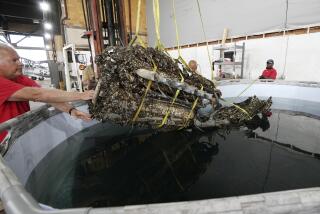Wartime Pilots Aiming to Repay a Debt of Honor
- Share via
MIAMI — It was 52 years ago when Roy Blaha and seven other cocky fighter pilots spotted a German freight train stopped near Remy, a small town about 50 miles north of Paris.
What happened in next has never been forgotten by the young World War II pilots or the people of Remy. Today, a group of the pilots, now in their 70s, are on one last mission for the village.
That sunny afternoon of Aug. 2, 1944, four of the P-51 Mustangs stayed high to watch for enemy planes. Four others peeled off and went down to blast away at the Germans, who were putting up a fierce defense about two months after the Allied landing at Normandy.
There was clearly something interesting inside the 18 boxcars parked in front of the tiny station near Remy, a town of about 2,000 who had endured about five years under the control of the Nazis. The train cars were draped with branches in an attempt at camouflage.
Villagers’ and farmers’ eyes turned skyward as the P-51s came in one at a time, slamming the boxcars with bullets.
On the fourth pass, the train exploded in a fireball, a shock wave almost flipping over the four planes flying cover at 10,000 feet.
It wasn’t just ammunition on the train, Army intelligence later determined, but perhaps nitroglycerin or warheads aimed for London.
The explosion killed about 400 Germans and one of the pilots. A boy a mile away also perished, impaled by a piece of iron.
The blast also blew out seven large, stained glass windows in the town’s 700-year-old church. Those windows and the risks the townspeople took in recovering and hiding the American pilot’s body are what keep that day vivid for the 364th Fighter Group.
That’s also why the group is on its final mission--to replace the windows of St. Denis by raising $200,000. Since learning of the windows in 1994, it has raised $70,000. Blaha calls it a debt of honor.
The fireball from the explosion blew the tail off the plane flown by Houston Lee Braly of Brady, Texas. He was probably dead when his aircraft hit the ground.
A woman and her brother ran outside and, before the plane could explode, pulled out the body, snatched the pilot’s dogtags and hid the body from the Germans.
“The Nazi commander found out about it and ordered Braly to be buried in the church cemetery and for people to stay away. Only four people were allowed at the burial,” Blaha said. “Fresh flowers started showing up every morning on the grave. The Germans threatened to execute anyone caught putting flowers on the grave. The next day the grave was covered with even more flowers and there were flowers every day.”
A month later, the Germans retreated from Remy.
Contributions may be sent to Windows for Remy, P.O. Box 644, Linden, Calif. 95236. (510) 824-2466.
More to Read
Sign up for Essential California
The most important California stories and recommendations in your inbox every morning.
You may occasionally receive promotional content from the Los Angeles Times.










